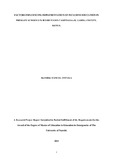| dc.description.abstract | Education empowers people with the knowledge, skills and values they need to build a better
world. Given the situation in Dadaab refugee camps, normal learning is faced with a number
of challenges, however, little is known on schools in refugee camps are supposed to
implement inclusive education (I.E) as per the policy of Ministry of Education Science and
Technology (MOEST). Therefore the study established factors influencing implementation of
inclusive education in primary schools in ifo refugee camp dadaab, garisa county, kenya. The
study objectives were: to establish how schools infrastructures influence implementation of
Inclusive Education in Ifo refugee camp; establish how Children with Disability influence
implementation of inclusive education in primary schools in Ifo refugee camp primary
schools; determine the extent to which teachers‟ competence influence the implementation
of inclusive education in Ifo refugee camp Primary Schools, Dadaab and to determine how
availability of financial resources influences Inclusive . Education in Ifo refugee camp
primary schools. The study was guided by conceptual framework showing the relations
between the variables on the factors influencing implementation of inclusive education and
implementation of inclusive education. A descriptive survey research design was employed, a
simple random sampling technique was used to obtain the sample size of 350 from which 328
were valid for data analysis depicting 93.7% of the total population. Open and closed ended
questionnaires and interview schedules were used to collect data. A correlation of 0.82 using
Pearson product moment correlation was obtained for Test re-tests reliability. Content
validity was used to obtain the validity of the data instrument used. Quantitative data was
analyzed using both inferential and descriptive statistics involving means, percentages and
standard deviation and presented in tables. Qualitative data was transcribed and reported. The
findings revealed that infrastructure had an influence on implementation of inclusive
education with (r=.524, p<.05), and it accounted for 33.3% of implementation of inclusive
education, (adjusted R Square=.333, p<.01, F (1,327)=42.953). It was also revealed that
children with disability had an influence on implementation of inclusive education (r=.338,
p<.01) and that there was a moderate but positive correlation between teacher competency
and implementation of inclusive education (r=.466, p<.01). Finally the study revealed that
there was a moderate significant positive correlation between sufficient funding and the
implementation of inclusive education in IFO schools, (r=.760, p< .01). The study concluded
that infrastructure; children with disability, teacher‟s competency and sufficient funding had
an influence on the implementation of inclusive education. Finally, the study recommends
that the Ministry of education conform the infrastructures layout to disability requirements;
more teachers should be trained beyond certificate level to handle LWD in schools; and
detailed plan for inclusive education should be budgeted and funded | en_US |

